
John Fiske was an American philosopher and historian. He was heavily influenced by Herbert Spencer and applied Spencer's concepts of evolution to his own writings on linguistics, philosophy, religion, and history.
This article contains information about the literary events and publications of 1877.

Herbert Spencer was an English polymath active as a philosopher, psychologist, biologist, sociologist, and anthropologist. Spencer originated the expression "survival of the fittest", which he coined in Principles of Biology (1864) after reading Charles Darwin's 1859 book On the Origin of Species. The term strongly suggests natural selection, yet Spencer saw evolution as extending into realms of sociology and ethics, so he also supported Lamarckism.

The Ancient and Mystical Order Rosæ Crucis (AMORC), also known as the Rosicrucian Order, is the largest Rosicrucian organization in the world. It has various lodges, chapters and other affiliated bodies throughout the globe, operating in 19 different languages. It operates as a fraternal order in the mystical Western Esoteric Tradition
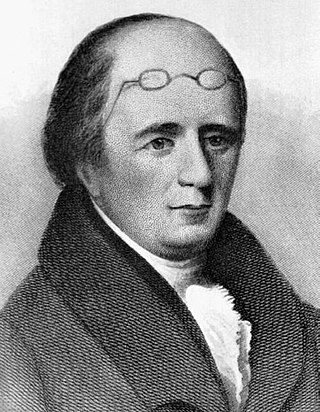
William Morgan was a resident of Batavia, New York, whose disappearance and presumed murder in 1826 ignited a powerful movement against the Freemasons, a fraternal society that had become influential in the United States. After Morgan announced his intention to publish a book exposing Freemasonry's secrets, he was arrested on trumped-up charges. He disappeared soon after and was believed to have been kidnapped and killed by Masons from western New York.

Sir Edward Burnett Tylor was an English anthropologist, and professor of anthropology.
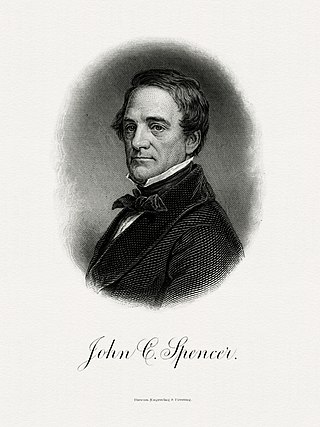
John Canfield Spencer was an American lawyer, politician, judge and United States Cabinet secretary in the administration of President John Tyler.
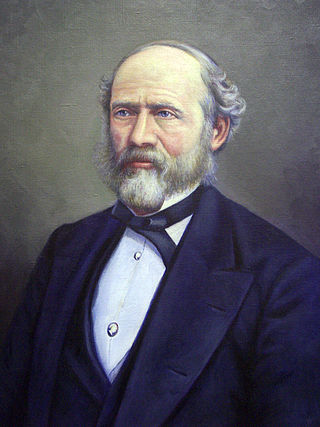
Lewis Henry Morgan was a pioneering American anthropologist and social theorist who worked as a railroad lawyer. He is best known for his work on kinship and social structure, his theories of social evolution, and his ethnography of the Iroquois. Interested in what holds societies together, he proposed the concept that the earliest human domestic institution was the matrilineal clan, not the patriarchal family.
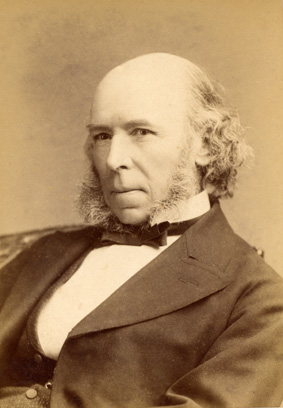
"Survival of the fittest" is a phrase that originated from Darwinian evolutionary theory as a way of describing the mechanism of natural selection. The biological concept of fitness is defined as reproductive success. In Darwinian terms, the phrase is best understood as "survival of the form that in successive generations will leave most copies of itself."
The Thinker's Library was a series of 140 hardcover books published between 1929 and 1951 for the Rationalist Press Association by Watts & Co., London, a company founded by the brothers John and Charles Watts and then run by the latter's son Charles Albert Watts. The name was suggested by Archibald Robertson, a member of the company's board of directors, who took an active interest in setting up the series and was later to write several volumes himself. The Thinker’s Library was intended as a successor to the cheap paperback “Sixpenny Reprints” from the same publisher, the aim being to bring humanist, philosophical and scientific works to as wide an audience as possible. Unlike the previous series, the volumes in the Thinker’s Library were small hardbacks bound in brown clothette, with grey dustjackets, priced at one shilling. The covers of the early editions featured title, author’s name and a brief description of the book between Doric columns, with the image of Rodin’s The Thinker at the foot. The design would change several times over the course of the series, but the figure of the Thinker remained ever-present.
Leslie Alvin White was an American anthropologist known for his advocacy of the theories on cultural evolution, sociocultural evolution, and especially neoevolutionism, and for his role in creating the department of anthropology at the University of Michigan Ann Arbor. White was president of the American Anthropological Association (1964).
Sociocultural evolution, sociocultural evolutionism or social evolution are theories of sociobiology and cultural evolution that describe how societies and culture change over time. Whereas sociocultural development traces processes that tend to increase the complexity of a society or culture, sociocultural evolution also considers process that can lead to decreases in complexity (degeneration) or that can produce variation or proliferation without any seemingly significant changes in complexity (cladogenesis). Sociocultural evolution is "the process by which structural reorganization is affected through time, eventually producing a form or structure that is qualitatively different from the ancestral form".
The following events related to sociology occurred in the 1820s.

Unilineal evolution, also referred to as classical social evolution, is a 19th-century social theory about the evolution of societies and cultures. It was composed of many competing theories by various anthropologists and sociologists, who believed that Western culture is the contemporary pinnacle of social evolution. Different social status is aligned in a single line that moves from most primitive to most civilized. This theory is now generally considered obsolete in academic circles.

The Origin of the Family, Private Property and the State: in the Light of the Researches of Lewis H. Morgan is an 1884 anthropological treatise by Friedrich Engels. It is partially based on notes by Karl Marx to Lewis H. Morgan's book Ancient Society (1877). The book is an early historical materialist work and is regarded as one of the first major works on family economics.
Morgan, Lewis & Bockius LLP is an American multinational law firm with approximately 2,200 legal professionals in 31 offices across North America, Europe, Asia, and the Middle East. Mergers with other law firms stimulated global growth and led to a ranking of eighth on The American Lawyer's 2018 top 100 firms by gross revenue list. It is also the largest law firm chaired by a woman and represents "three-quarters of the Fortune 100 companies."
Cultural materialism is an anthropological research orientation first introduced by Marvin Harris in his 1968 book The Rise of Anthropological Theory, as a theoretical paradigm and research strategy. It is said to be the most enduring achievement of that work. Harris subsequently developed a full elaboration and defense of the paradigm in his 1979 book Cultural Materialism. To Harris social change is dependent of three factors: a society's infrastructure, structure, and superstructure.
The following events related to sociology occurred in the 1870s.

Llanfihangel-y-Creuddyn is an ancient parish in the upper division of the hundred of Ilar, Ceredigion, West Wales, 7 miles south east from Aberystwyth, on the road to Rhayader, comprising the chapelry of Eglwys Newydd, or Llanfihangel y Creuddyn Uchaf, and the township of Llanfihangel y Creuddyn Isaf. It was also known as Lower Llanfihangel y Creuddyn, Lower Llanfihangel y Croyddin and Lower Llanfihangel y Croyddyn. This parish is situated on the rivers Ystwyth, Mynach and Rheidol and intersected by various other streams. An ancient parish was a village or group of villages or hamlets and the adjacent lands. Originally they held ecclesiastical functions, but from the sixteenth century onwards they also acquired civil roles. The parish may have been established as an ecclesiastical parish. Originally a medieval administrative unit, after 1597 ecclesiastical units acquired civil functions with the Elizabethan Poor Laws, which made the parishes responsible for welfare. The civil function was exercised through vestry meetings which administered the Poor Law and were responsible for local roads and bridges.
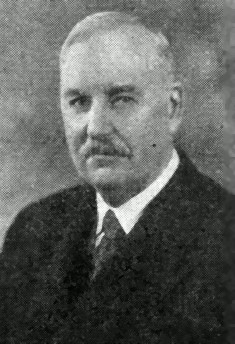
Herbert Ritchie Spencer was professor of obstetrics at University College London.